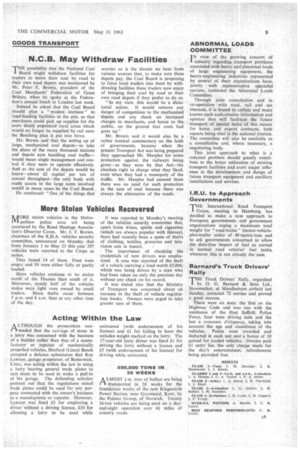N.C.B. May Withdraw Facilities
Page 11

If you've noticed an error in this article please click here to report it so we can fix it.
THE possibility that the National Coal Board might withdraw facilities for traders to move their coal by road to their own road depots was mentioned by Mr. Peter E. Brewis, president of the Coal Merchants' Federation of Great Britain, when he spoke at the Federation's annual lunch in London last week.
Instead he asked, that the Coal Board should plan a "modest increase" in road-loading facilities at the pits, so that merchants could pick up supplies for the more thinly populated rural areas which would no longer be supplied by rail once the Beeching plan is put into force.
Mr. Brewis said that the setting up of large, mechanized coal depots—to take the place of the many thousand stations and depots now handling coal traffic— would mean single management and control if they were to operate effectively. And as the cost of the depots would be heavy—about £2 capital per ton of annual throughput—the only body with ready access to the large sums involved would in many cases be the Coal Board.
He continued: "One of the things that worries us is the threats we hear from various sources that, to make sure these depots pay, the Coal Board is proposing to force local traders into them by withdrawing facilities these traders now enjoy of bringing their coal by road to their own road depots if they prefer to do so.
'In my view, this would be a dictatorial action. It would remove any danger of competition to the mechanized depots and any check on increased charges to merchants, and hence to the public, on the ground that costs had gone up."
Mr. Brewis said it would also be a rather ironical commentary on the faith of governments, because when the present Transport Act was being prepared they approached Mr. Marples for some protection against the railways being given—as they were by that Act—the absolute right to charge what they liked, even when they had a monopoly of the traffic. Mr. Marples had assured them there was no need for such protection in the case of coal because there was always the alternative of the roads.












































































































